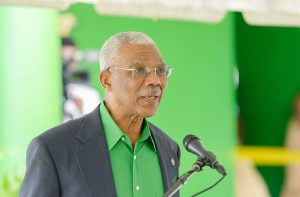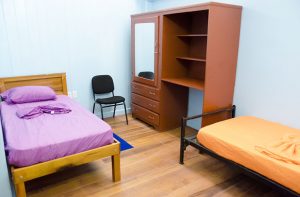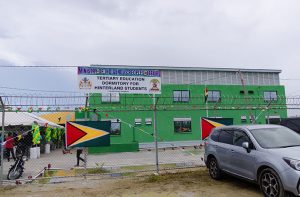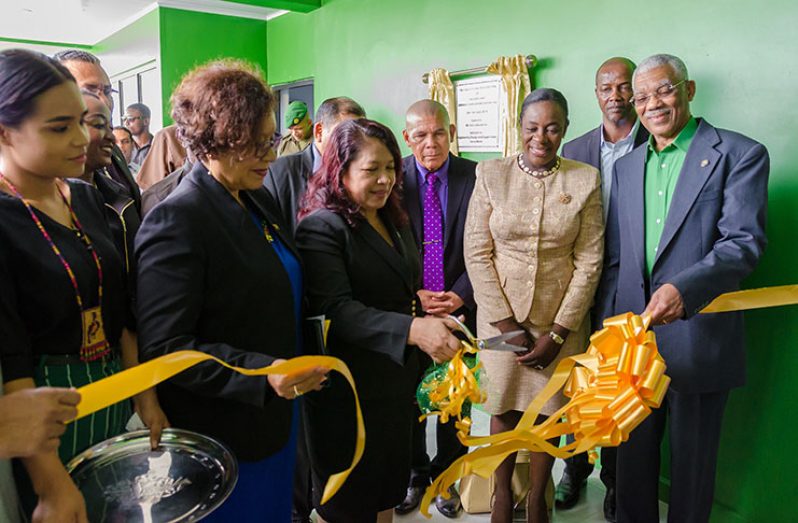…President commissions $186.3M hinterland tertiary students dorm
…aimed at reducing disparities through education
PRESIDENT David Granger commissioned a $186.3M Tertiary Students’ Dormitory at Liliendaal on Monday as his Government continues to reduce the disparities between the hinterland and coastland through education.
The multimillion dollar state-of-the-art facility was built to accommodate 120 students – 64 males and 56 females – from the hinterland, who are pursuing tertiary education in various fields at institutions in Georgetown.

In his address which followed the dedication of the building by The Right Reverend Charles Davidson, Bishop of Guyana, President Granger said the establishment of the Tertiary Students’ Dormitory was in keeping with the 10-Point Plan of Action for Hinterland Development, which he had laid out at the 2015 Conference of the National Toshaos’ Council. The Head of State explained that the ‘Plan of Action’wais aimed at reducing inequality between residents of the hinterland and the rest of country by eradicating poverty, promoting employment and economic prosperity and by enhancing access to public services. “The Plan of Action has guided Government’s actions to empower hinterland residents through education, employment, economic enterprises, energy, infrastructure, land rights, poverty-reduction, public services and cultural development,” he noted.
For the A Partnership for National Unity + Alliance for Change (APNU+AFC) Government, education is the surest and swiftest way to reduce inequality, because, as an equalizer, it helps to unlock increased economic opportunities for citizens. As such, the Administration has placed significant attention on ensuring there is access to quality education. Noting that education is an entitlement, President Granger said, however, that it could only be realized if every child has access to primary and secondary education; attends school and attains the ultimate objectives of education by completing his or her schooling.

Photos by Delano Williams
“Guyana’s education policy emphasizes the three ‘A’s – ‘A’ for access; ‘A’ for attendance and ‘A’ for attainment. This means that every child must be assured of access to school; must be enabled to attend school and be equipped with the knowledge to attain a satisfactory standard of education. The opening of this dormitory adds a fourth ‘A’ – accommodation,” President Granger said.
He noted that accommodation is being improved by the provision of accommodation for students, and the opening of the $186.3M dormitory facility at Liliendaal is an excellent example of Government’s commitment to providing access to education by making accommodation readily available.
“The establishment of this tertiary education dormitory attests to Government’s commitment to improving educational opportunities for hinterland students. It reflects our intention to ensure a more equal society by reducing the disparities between the hinterland and coastland through education,” President Granger told government and non-governmental officials and students who gathered to witness the commissioning of the dorm.
“Government, through the Ministry of Indigenous Peoples’ Affairs has done well to make this facility available. It will ensure a more conducive environment for hinterland students attending the University of Guyana and other tertiary institutions,” the President added.
Dormitories have been constructed at 19 locations across nine regions, and as a result, more hinterland students are benefiting from educational services that are not accessible in their communities. However, President Granger said he looks forward to the day when every regional capital town – Anna Regina, Bartica, Lethem, Mabaruma and Mahdia – will establish a first-class college to enable hinterland students to enjoy the best secondary and, later, tertiary education within their communities. He assured those present that, that day will come.
ACADEMIC REVOLUTION
Minister within the Ministry of Indigenous Peoples’ Affairs, Valerie Garrido-Lowe, in giving a detailed overview of the project, said the $186.3M modern facility will create an academic and vocational revolution in the lives of indigenous and hinterland peoples throughout the country.
“This is not just a building. It is a vessel – an opening –that will allow for the economic and social transformation of indigenous communities by indigenous and hinterland people, across Guyana. Such is the vision of a caring and thoughtful Government led by a caring and thoughtful leader. This is testimony to the fact that your Government is committed to creating a “real-time” development environment for our people, thereby departing from the past trend of giving “handouts” and making us dependent instead,” Minister Garrido-Lowe said.
Noting that human capital development is a ‘front burner’ subject of any Government’s agenda, the Minister said she is pleased that the APNU+AFC Government has placed significant resources into the development of the Education Sector.
Garrido-Lowe said the opening of the dorm is an indication that more indigenous youths can be trained in various skill and academic areas as they seek to develop and transform the very villages from which they come.
Noting that Guyana is at the cusp of economic transformation, one based on a shift in paradigm into a green state, the Junior Indigenous Peoples’ Affairs Minister said such development requires innovative thinkers that would help the country to pursue technological advancements that are eco-friendly and cost efficient.

“With oil proceeds imminent, our economy will be stimulated and more industries will be required to service the needs of the country. This is where the expertise and knowledge will be needed as jobs will be made available, albeit, on a more competitive basis. We recognize that our communities need more input and expertize. We need more educators, health workers, civil engineers, geologists, botanists, anthropologists, professional agriculturists, food scientists, and business people. We need to nurture and develop professions that will push the Green State Development Strategy into actuality,” Minister Garrido-Lowe said.
The Minister explained that, for far too long, the quest to access higher education by persons living in the hinterland has proven to be extremely challenging, especially as it relates to living accommodation in Georgetown.
“Those who would have attempted this hurdle would tell you of the painstaking challenges they would have met living with guardians, when they were otherwise fortunate to be given a scholarship to pursue studies on the coastland. Some of the stories were indeed troubling, and in some cases, unbearable to the extent that many had to abort their studies and head back home to their respective communities. Students from the hinterland regions, who are undertaking studies on the coast on their own accord, are said to be paying between twenty-five (25) to forty-five (45) thousand dollars per month for small spaces – just to complete their studies,” Minister Garrido-Lowe detailed.
While Government cannot promise accommodation for all at this time, the Minister assured those present that the Tertiary Students’ Dormitory will give 120 students an opportunity to pursue tertiary education. This will be a continuous cycle which will positively impact the lives of 215 indigenous communities countrywide, Minister Garrido-Lowe added.
To open up greater opportunities to indigenous students, the Minister said her team is consulting with tertiary institutions such as: Carnegie School of Home Economics, Guyana School of Agriculture (GSA), Government Technical Institute (GTI), Guyana Industrial Training Centre (GITC), Burrows School of Arts, the Board of Industrial Training (BIT) and even the University of Guyana (UG). Currently there are 26 students attending some of these institutions and are being accommodated, in the meantime, at the Indigenous hostel. The Tertiary Students’ Dormitory will be opened ahead of the start of the new academic year 2019/2020.
Vice President and Minister of Indigenous Peoples’ Affairs, Sydney Allicock said while the President’s 10-Point Plan was developed and made public in 2015, today it is bearing fruits. With just four years in Government, Minister Allicock said Government has taken active steps to address several developmental issues but said “everything takes time.” He said Government is committed to the country’s development, and is ready to partner with all to foster that development. Minister of State, Dawn Hastings-Williams; Minister of Education, Nicolette Henry; Minister of Social Cohesion, Dr. George Norton; and Minister within the Ministry of Social Protection Keith Scott were among the officials present at the commissioning ceremony.




.jpg)









